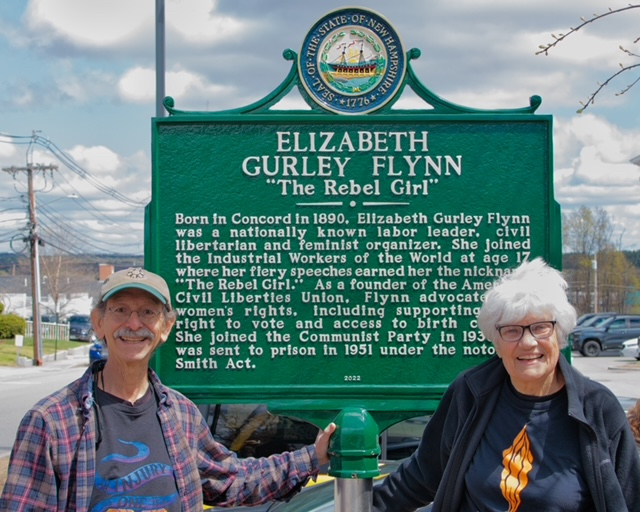
Arnie Alpert and Mary Lee Sargent in front of the Elizabeth Gurley Flynn highway marker they sponsored, before its removal
This article, commissioned for the Public i, appeared first in a longer version in Monthly Review on November 29, 2023, under the title “Gender, Labor, Democracy, and Americanism: U.S. History in the (Un)Making”; reprinted with permission.
In the early hours of Monday, May 15, 2023, a historical highway marker recognizing the birthplace of a renowned early 20th-century feminist, anti-racist labor organizer, and defender of reproductive rights was taken down.
The marker had been formally approved and erected by the state, following years of community effort.
It stood for two weeks before being removed by the governor.
No, this is not yet another example of Florida’s perverse persecution of those raising histories and realities outside of white nationalist narratives.
The marker did not stand in one of the many states mandating abstinence-only education and outlawing abortion, such as Texas, which incentivizes residents to sue women and youth seeking life-saving medical assistance (and the people who support them).
Nor is it a tale from any of the 27 states with “right-to-work” laws privileging profit over people by denying workers basic labor rights—not even Alabama, where prison officials allegedly encouraged inmates to murder union organizers.
The marker was not in one of our states which recently passed Kafkaesque legislation forbidding discussion of sexism, racism, and discrimination while criminalizing anyone acknowledging the existence of structural inequities.
This happened in New Hampshire: the birthplace of Elizabeth Gurley Flynn, the original rebel girl. This is a story of America.
The Original Rebel Girl
A founding member of the American Civil Liberties Union, Elizabeth Gurley Flynn was born in Concord, New Hampshire on August 8, 1890. She grew up poor as a child of working-class Irish immigrants.
“Why did good hard-working people suffer so?,” she asked. “I hated poverty . . . I was determined to do something about the bad conditions under which our family and all around us suffered.”
With dreams of becoming a constitutional lawyer, Flynn spent her life as a non-violent labor organizer standing with workers who, in her words, faced “lawless, aggressive, brutal and ruthless capitalism which garnered profits for a few at the expense of the many.”
At 15, Flynn joined the International Workers of the World (IWW), a cross-industry union of exploited workers, many of whom were immigrants. She found solidarity with those seeking rights promised by their country, and soon became an IWW organizer, advancing its motto: “an injury to one is an injury to all.”
It was here that Flynn earned the nickname “the rebel girl” as she led strikes challenging Gilded Age hoarding through denied pay, benefits, and rights. She delivered inspiring speeches demanding egalitarian access to wages, birth control, dignity, and justice.
Flynn opposed white supremacy and all forms of discrimination, identifying the KKK as fascist. In 1937, while the Great Depression raged and anti-democratic white nationalist forces gained power under Mussolini and Hitler, she accepted the call to join resistance efforts unifying through communism. For this, she was kicked out of the ACLU in 1939 (an action reversed in 1976).
In 1951, following the defeat of Italy’s and Germany’s fascist dictatorships, Flynn and other Communist Party officers were charged with conspiring to advocate violent overthrow of the government under the 1940 Smith Act.
This xenophobic federal legislation targeted immigrant labor organizers and politically dissenting US citizens amid New Deal pushback. Its use escalated under McCarthyism, deflecting blame from home-grown corporate fascism onto those opposing authoritarian subversion of rights, including communists and union leaders.
Then, as now, right-wing forces in the US aligned to destroy non-conformist resisters against crony capitalism.
Attorneys and civil rights groups abandoned Flynn and her colleagues. Corporate media fronted wider moneyed efforts to focus shame and blame on the accused, calling them outsider enemies. Anti-democratic US injustice was delivered through the well-worn pathway merging structural legislation with vigilantism.
At her trial, Flynn lacked legal representation, yet refused to cower. She denounced scapegoating tyranny:
“Our country is a rich and beautiful country, fully capable of producing plenty for all, educating its youth and caring for its aged. . . . I have seen textile workers who wove beautiful woolen fabrics shivering for lack of warm clothing, and coal miners living in cold shacks in company towns, and steel towns that were armed camps. I saw men black-listed, driven from town to town, forced to change their names because they had dared to try to organize a union.
“We will prove to you that it is not the Communists who have advocated or practiced force and violence but that it is the employing class which has done both. . . .
“We will prove that we are fighting here for our constitutional and democratic rights, not to advocate force and violence, but to expose and stop its use against the people.”
Though innocent, Flynn was sentenced to over two years in federal prison, where she stayed until age 66. At 71, she became the first woman to lead the Communist Party of the USA.
She died three years later in 1964 while visiting Moscow. Per her wishes, Flynn is buried in Illinois’ Forest Home Cemetery, near anarchist agitator Emma Goldman, the Haymarket martyrs, and activist musician Jolie Rickman. She donated her belongings to Dorothy Day’s Catholic Workers’ House.
And the country she loved continues to call her un-American.
The Rebel Girl Lives On
Historian and long-time activist Mary Lee Sargent is one of CU’s own “rebel girls.”
Now a New Hampshire resident, Sargent joined Arnie Alpert in 2020 to co-sponsor Elizabeth Gurley Flynn’s historical highway marker, following state guidelines. New Hampshire approved and, after COVID delays, constructed the marker near Flynn’s birthplace last May.
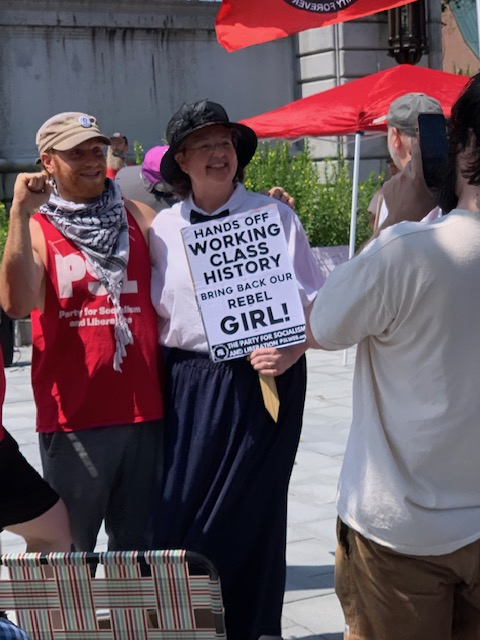
Flynn impersonator at the May 1, 2023 celebration of the marker’s erection
Shortly after, Republicans on New Hampshire’s powerful five-member Executive Council condemned the marker for recognizing a communist. Within days, eschewing state and democratic processes, the marker was gone.
Mary Lee Sargent is mad as hell. Luckily, fire unlocks the mightiest seeds.
Since the marker’s destruction, Sargent has hosted “Elizabeth Gurley Flynn Sit-Outs” at its original location. Progressives joined in, bringing chairs, signs, and flowers. Young and old, queer and straight, wealthy and poor residents spent hours discussing their lives and struggles. “It was like consciousness-raising groups,” Sargent exclaims. “They were learning from us, we were learning from them.” People of all walks of life now stand together supporting one another and resisting the state’s forsaking of Flynn.
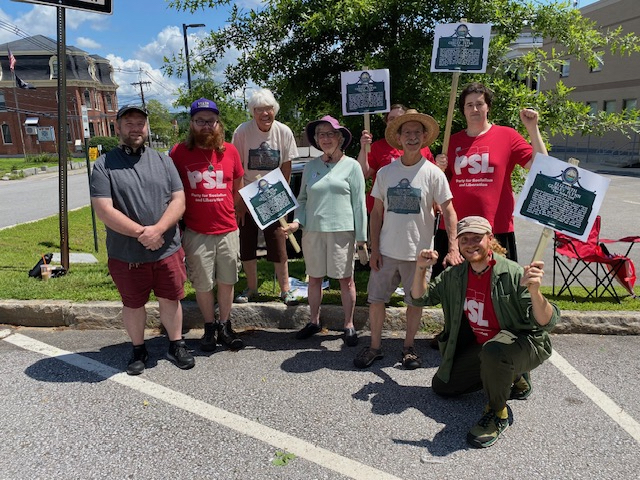
One of Sargent’s weekly “Elizabeth Gurley Flynn Sit-Outs”
Last August, Sargent and Alpert teamed with civil rights attorney Andru Volinsky to file a lawsuit charging the State of New Hampshire with violating their rights to due process, and with breaking the state’s Administrative Procedures Act and historic marker program guidelines.
Sargent sponsored the historical marker to educate locals about Elizabeth Gurley Flynn’s role in New Hampshire history. The state’s decision to, again, silence Flynn has suppressed the marker, but also freed Flynn from the annals of history to be known well beyond her hometown.
The historical marker has now multiplied onto yard signs throughout Concord. Articles covering Flynn’s legacy are being published across the country and around the world, retelling this shameful American tale.
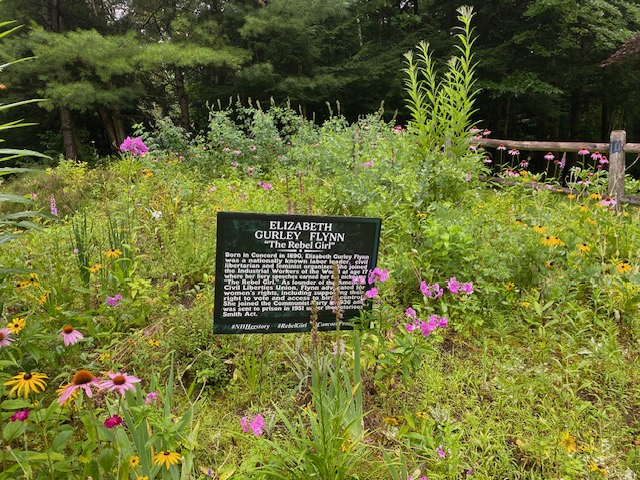
Flynn historic marker as yard sign in Concord, NH
From Florida to California, the US has historically demonized justice-seekers like Flynn marginalized within racist, sexist, anti-democratic profiteering. This is a tactic of economic and political imperialism. As Silvia Federici reminds us, “the witch-hunt was one of the most important events in the development of capitalist society.”
Witch-hunts are not a relic of the past—they abound within America’s white nationalism, justifying brutality toward those who dare acknowledge inequity while providing impunity to powerful robber barons, bigots, and bullies. You have been enlisted.
As winter falls, the seeds of knowledge needed to stem rising fascism spread. They blossom in flames of consciousness-raising, unveiling both collective strength, and settler-colonial roots organized to exploit and silence right-seekers while hoarding democratic rights.
Don’t be duped by lying fascist propaganda denying these roots while criminalizing those forced to fight them now, and in our past. Add your fire to the struggle.
Stand proud with your neighbors, rebel girls. We need you.
We have always needed you.
You can hear the music of Jolie Rickman here, here, here, and here.
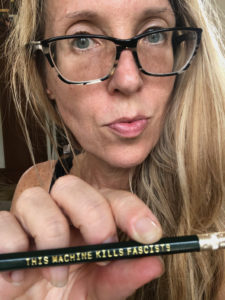
Aimee Rickman is an educator; activist; organizer; ethnographer of youth, culture, and technology; and author of Adolescence, Girlhood, and Media Migration (Lexington Books, 2018).
902 total views, 2 views today